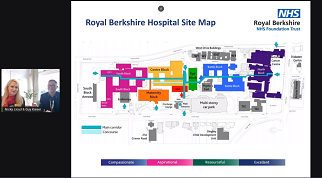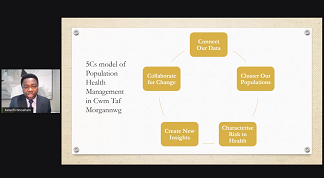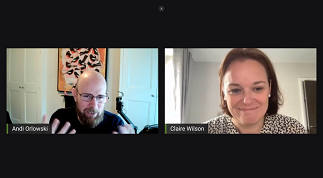Comment / HFMA Hub: reflections and highlights of 2022/23
Last year, the HFMA Hub programme 2022/23 comprised eight online events, including 42 sessions. Using delegate feedback*, we have compiled the below list of the top 10 sessions across the programme year, starting with the highest rated. We have also included attendee quotes where available. The sessions contain valuable insights and best practice directly relevant to many organisations and practitioners.
Make sure you are logged in to your HFMA account so you can follow links to relevant further resources. If you don’t have an HFMA account, but belong to a Hub partner organisation, register here for a free HFMA affiliate account.
1. Sustainable healthcare: insights from the Royal Berkshire NHS Foundation Trust
Event: Environmental sustainability in the health service – 6 October 2022
(chair) John Williams, executive director of finance, Sheffield Children's NHS Foundation Trust
Nicky Lloyd, chief finance officer, Royal Berkshire NHS Foundation Trust
Guy Kieser, associate director of estates, Royal Berkshire NHS Foundation Trust
‘Really good to have a CFO speaking with commitment and passion - hopefully Nicky is giving a lead and other CFOs will step up too.’
Ms Lloyd and Mr Kieser, from the Royal Berkshire NHS Foundation Trust, spoke passionately about the work being undertaken across the organisation to meet its ambitious net zero target of 2030. Mr Kieser highlighted how strategic investment was at the core of the trust’s capital programme, ensuring that the right platforms were chosen to ensure future proofing of the estate. This was particularly relevant to the Royal Berkshire Hospital’s desteaming project, which replaced a 60-year-old heating system that was costing £350,000 annually purely through energy loss. Ms Lloyd talked about the importance of engaging the workforce, who have been pivotal in driving forward climate awareness and action across the trust.

2. Making data count
Event name: Chairs' conference – 7 April 2022
(chair) Barbara Gregory, non-executive director and chair of audit committee, Somerset NHS Foundation Trust
Samantha Riley, deputy director of intensive support, NHS England
'SPC charts are great – our board had a development session directly with NHS England and introduced them in 2021.'
Statistical process control (SPC), which was discussed in a recent Healthcare Finance article, has recently seen wide adoption in the NHS, mainly at board level. During the session, Ms Riley advocated for SPC to be deployed organisation-wide. SPC provides greater visualisation of performance trends so allows for better planned and targeted response to declining performance, avoiding knee jerk reactions that in some cases can cause more harm. Understanding of SPC at all levels will help increase understanding of where and why performance management is being targeted.
Ms Riley introduced the term ‘spuddling’, which means ‘to make a lot of fuss about trivial things as if they were important’ – a common occurrence with red, amber and green (RAG) reporting. This term proved useful in the roll out of SPC, helping users to focus on trends rather than individual points of performance data.
3. Understanding cost drivers through population health analysis
Event name: Health inequalities and population health management – 5 May 2022
(chair) Kavita Gnanaolivu, chair of HFMA Wales Branch and director of healthcare, KPMG UK Professor Kelechi Nnoaham, executive director of public health, Cwm Taf Morgannwg University Health Board
‘Really interesting to see the combined condition factors’
The first of four sessions on this list from the Hub’s highest-rated overall event of the programme, the health inequalities and population health management conference. Professor Nnoaham discussed how the use of population health analytics can be used to better understand the cost drivers by population segment and location. While still in the learning process at Cwm Taf Morgannwg, he touched upon the insights gained to date and how they had already been incorporated in the health board’s approach to tailoring service provision. He also highlighted the difference between historical resource allocations when compared with a needs-based approach.

4. Value based decision-making
Event name: Environmental sustainability in the health service – 6 October 2022
(chair) John Williams, executive director of finance, Sheffield Children's NHS Foundation Trust
Mark Gough, chief executive officer, Capitals Coalition
‘Mark offered some significant, valuable and relevant information and thoughts and should be included on the HFMA's list of "extremely influential speakers"!’
Mr Gough’s session challenged the finance and accountancy profession to be at the forefront of the global battle against nature loss, climate change, and rising inequality. He argued that current economic systems fail to recognise the dependency and impact on natural, people, and societal capitals. Engaging finance professionals early on can help ensure that the value of this capital is realised at the core of decision-making.
5. Case studies: recruitment in mental health
Event name: Mental health conference – 29 September 2022
(chair) Drew Kendall, director of finance, Tees, Esk and Wear Valleys NHS Foundation Trust
Kay Gilman, head of international recruitment, Lincolnshire Partnership NHS Foundation Trust
Rachel Kirby, marketing & communications manager, Humber Teaching NHS Foundation Trust
‘Both presentations [were] really encouraging that, with the right plan and the right people supporting and sufficient budget improvement, workforce challenges can be improved.’
The two separate speakers described their trusts’ successful approaches to the recruitment crisis within the NHS. Lincolnshire Partnership NHS Foundation Trust focused on specifically targeted international recruitment drive of mental health nurses. She highlighted the challenges unique to mental health recruitment, declaring the programme to be the most complicated recruitment process she has been involved with. However, she said the process and outcomes had been worth the investment.
Humber Teaching NHS Foundation Trust ‘Humbelievable’ recruitment campaign was shortlisted for a Health Service Journal communication award. The key components of the campaign were: ensuring it was driven and supported across the breadth of the organisation; providing engagement for applicants all the way from pre-application to their first few weeks in-role; and using data and analytics to target efforts.

6. Mental health for all? A system designed for equality
Event name: Health inequalities and population health management – 5 May 2022
(chair) Kavita Gnanaolivu, chair of HFMA Wales branch and director healthcare, KPMG UK
Andy Bell, deputy chief executive, Centre for Mental Health
‘Really thought provoking and many of the considerations Andy discussed should be mandated in service design and delivery i.e. trauma awareness.’
Mr Bell opened the session reflecting how systems and mental health services are currently set-up and how they often reinforce inequalities. He said this was particularly concerning as the data suggested inequalities and rates of poor mental health will increase, further exacerbating the gaps. This means it is vital to reflect on how systems and provisions are structured. Mr Bell highlighted that this is relevant to all, regardless of role or organisation, as we all have a part to play in restructuring how we deal with mental health.
7. Setting the scene – health inequalities across the UK
Event name: Health inequalities and population health management – 5 May 2022
(chair) Steve Elliot, interim director of finance for health and social care, Welsh Government
David Buck, senior fellow - public health and health inequalities, The King's Fund
‘Brilliant definition of health inequalities, entertaining talk’
The session gave a grounded overview of health inequalities in the UK at present, which provided a jumping off point for the rest of the sessions at the health inequalities and population health management conference. Mr Buck suggested healthcare inequalities were often part of a negative conversation, but there are significant opportunities for the health service to make a positive impact.
He highlighted estimates that UK income inequalities would be 13% greater without the NHS as it exists today, with the health service being a huge contributor to the UK economy. And with such a large impact, the NHS sits in a prime position to make a direct impact while also having an influence in wider society.
8. Place as a focus for tough agendas
Event name: Health inequalities and population health management – 5 May 2022
(chair) Steve Elliot, interim director of finance for health and social care, Welsh Government
Diarmaid Lawlor, associate director – place, Scottish Futures Trust
‘Always good to have it from a 'persons’ perspective.’
Mr Lawlor shared the work being undertaken in Scotland to put place at the forefront of the design of public services and how that supports health and wellbeing. He discussed how engagement with people and understanding a community should drive decision-making, rather than relying on imposed structures and processes that may not create the best outcomes. Mr Lawlor also considered how the approach to local investment needs to change to recognise this emphasis on population need.
9. How to allocate resources to meet your ICB priorities?
Event name: Setting the priorities for ICBs – 21 September 2022
(chair) Claire Wilson, executive director of finance, Cheshire & Merseyside ICB
Andi Orlowski, director, Health Economics Unit
This webinar focused on the application of the socio-technical allocation of resources (STAR) method developed by the Health Economics Unit to help integrated care boards (ICBs) improve resource allocation to better address system priorities. According to Mr Orlowski, the key to the method was understanding the societal element, which focuses on reaching collective agreement with service users and partners within a system. At the time of the session, it was being used at five ICBs. Mr Orlowski explained that the reports generated from the STAR method support users to make decisions based on the needs of their population by focusing on areas of costs and areas of value.

10. Understanding rural population health needs
Event name: Health inequalities and population health management – 5 May 2022
(chair) Steve Elliot, interim director of finance for health and social care, Welsh Government
Dr Declan Bradley, consultant in public health medicine, Public Health Agency, Northern Ireland
Dr Bradley described a pathfinder project undertaken with the Western Health and Social Care Trust, Northern Ireland, to understand population health and wellbeing needs in the Fermanagh and West Tyrone area. This region is rural, with areas that are sparsely populated, which made the provision of some services a challenge. Dr Bradley highlighted the work that aimed to actively engage with the population and the analysis of the qualitative outputs from these events. He discussed the results in the context of remote services and the wider economic impacts on people of health and healthcare.
You can view the 2023/24 Hub programme here. If you have any questions regarding the above sessions or about the Hub in general, please get in touch with [email protected].
*The rankings are calculated using attendee scores for each session (based on total votes for excellent – 4, good – 3, fair – 2 and poor – 1, then divided by the number of votes to provide an average) as provided during the post-event feedback form. Sessions have only been included in the list where we have permission from the speakers to share the recording post-event.
Make sure you are logged in to your HFMA account so you can follow links to relevant further resources. If you don’t have an HFMA account, but belong to a Hub partner organisation, register here for a free HFMA affiliate account.
1. Sustainable healthcare: insights from the Royal Berkshire NHS Foundation Trust
Event: Environmental sustainability in the health service – 6 October 2022
(chair) John Williams, executive director of finance, Sheffield Children's NHS Foundation Trust
Nicky Lloyd, chief finance officer, Royal Berkshire NHS Foundation Trust
Guy Kieser, associate director of estates, Royal Berkshire NHS Foundation Trust
‘Really good to have a CFO speaking with commitment and passion - hopefully Nicky is giving a lead and other CFOs will step up too.’
Ms Lloyd and Mr Kieser, from the Royal Berkshire NHS Foundation Trust, spoke passionately about the work being undertaken across the organisation to meet its ambitious net zero target of 2030. Mr Kieser highlighted how strategic investment was at the core of the trust’s capital programme, ensuring that the right platforms were chosen to ensure future proofing of the estate. This was particularly relevant to the Royal Berkshire Hospital’s desteaming project, which replaced a 60-year-old heating system that was costing £350,000 annually purely through energy loss. Ms Lloyd talked about the importance of engaging the workforce, who have been pivotal in driving forward climate awareness and action across the trust.

2. Making data count
Event name: Chairs' conference – 7 April 2022
(chair) Barbara Gregory, non-executive director and chair of audit committee, Somerset NHS Foundation Trust
Samantha Riley, deputy director of intensive support, NHS England
'SPC charts are great – our board had a development session directly with NHS England and introduced them in 2021.'
Statistical process control (SPC), which was discussed in a recent Healthcare Finance article, has recently seen wide adoption in the NHS, mainly at board level. During the session, Ms Riley advocated for SPC to be deployed organisation-wide. SPC provides greater visualisation of performance trends so allows for better planned and targeted response to declining performance, avoiding knee jerk reactions that in some cases can cause more harm. Understanding of SPC at all levels will help increase understanding of where and why performance management is being targeted.
Ms Riley introduced the term ‘spuddling’, which means ‘to make a lot of fuss about trivial things as if they were important’ – a common occurrence with red, amber and green (RAG) reporting. This term proved useful in the roll out of SPC, helping users to focus on trends rather than individual points of performance data.
3. Understanding cost drivers through population health analysis
Event name: Health inequalities and population health management – 5 May 2022
(chair) Kavita Gnanaolivu, chair of HFMA Wales Branch and director of healthcare, KPMG UK Professor Kelechi Nnoaham, executive director of public health, Cwm Taf Morgannwg University Health Board
‘Really interesting to see the combined condition factors’
The first of four sessions on this list from the Hub’s highest-rated overall event of the programme, the health inequalities and population health management conference. Professor Nnoaham discussed how the use of population health analytics can be used to better understand the cost drivers by population segment and location. While still in the learning process at Cwm Taf Morgannwg, he touched upon the insights gained to date and how they had already been incorporated in the health board’s approach to tailoring service provision. He also highlighted the difference between historical resource allocations when compared with a needs-based approach.

4. Value based decision-making
Event name: Environmental sustainability in the health service – 6 October 2022
(chair) John Williams, executive director of finance, Sheffield Children's NHS Foundation Trust
Mark Gough, chief executive officer, Capitals Coalition
‘Mark offered some significant, valuable and relevant information and thoughts and should be included on the HFMA's list of "extremely influential speakers"!’
Mr Gough’s session challenged the finance and accountancy profession to be at the forefront of the global battle against nature loss, climate change, and rising inequality. He argued that current economic systems fail to recognise the dependency and impact on natural, people, and societal capitals. Engaging finance professionals early on can help ensure that the value of this capital is realised at the core of decision-making.
5. Case studies: recruitment in mental health
Event name: Mental health conference – 29 September 2022
(chair) Drew Kendall, director of finance, Tees, Esk and Wear Valleys NHS Foundation Trust
Kay Gilman, head of international recruitment, Lincolnshire Partnership NHS Foundation Trust
Rachel Kirby, marketing & communications manager, Humber Teaching NHS Foundation Trust
‘Both presentations [were] really encouraging that, with the right plan and the right people supporting and sufficient budget improvement, workforce challenges can be improved.’
The two separate speakers described their trusts’ successful approaches to the recruitment crisis within the NHS. Lincolnshire Partnership NHS Foundation Trust focused on specifically targeted international recruitment drive of mental health nurses. She highlighted the challenges unique to mental health recruitment, declaring the programme to be the most complicated recruitment process she has been involved with. However, she said the process and outcomes had been worth the investment.
Humber Teaching NHS Foundation Trust ‘Humbelievable’ recruitment campaign was shortlisted for a Health Service Journal communication award. The key components of the campaign were: ensuring it was driven and supported across the breadth of the organisation; providing engagement for applicants all the way from pre-application to their first few weeks in-role; and using data and analytics to target efforts.

6. Mental health for all? A system designed for equality
Event name: Health inequalities and population health management – 5 May 2022
(chair) Kavita Gnanaolivu, chair of HFMA Wales branch and director healthcare, KPMG UK
Andy Bell, deputy chief executive, Centre for Mental Health
‘Really thought provoking and many of the considerations Andy discussed should be mandated in service design and delivery i.e. trauma awareness.’
Mr Bell opened the session reflecting how systems and mental health services are currently set-up and how they often reinforce inequalities. He said this was particularly concerning as the data suggested inequalities and rates of poor mental health will increase, further exacerbating the gaps. This means it is vital to reflect on how systems and provisions are structured. Mr Bell highlighted that this is relevant to all, regardless of role or organisation, as we all have a part to play in restructuring how we deal with mental health.
7. Setting the scene – health inequalities across the UK
Event name: Health inequalities and population health management – 5 May 2022
(chair) Steve Elliot, interim director of finance for health and social care, Welsh Government
David Buck, senior fellow - public health and health inequalities, The King's Fund
‘Brilliant definition of health inequalities, entertaining talk’
The session gave a grounded overview of health inequalities in the UK at present, which provided a jumping off point for the rest of the sessions at the health inequalities and population health management conference. Mr Buck suggested healthcare inequalities were often part of a negative conversation, but there are significant opportunities for the health service to make a positive impact.
He highlighted estimates that UK income inequalities would be 13% greater without the NHS as it exists today, with the health service being a huge contributor to the UK economy. And with such a large impact, the NHS sits in a prime position to make a direct impact while also having an influence in wider society.
8. Place as a focus for tough agendas
Event name: Health inequalities and population health management – 5 May 2022
(chair) Steve Elliot, interim director of finance for health and social care, Welsh Government
Diarmaid Lawlor, associate director – place, Scottish Futures Trust
‘Always good to have it from a 'persons’ perspective.’
Mr Lawlor shared the work being undertaken in Scotland to put place at the forefront of the design of public services and how that supports health and wellbeing. He discussed how engagement with people and understanding a community should drive decision-making, rather than relying on imposed structures and processes that may not create the best outcomes. Mr Lawlor also considered how the approach to local investment needs to change to recognise this emphasis on population need.
9. How to allocate resources to meet your ICB priorities?
Event name: Setting the priorities for ICBs – 21 September 2022
(chair) Claire Wilson, executive director of finance, Cheshire & Merseyside ICB
Andi Orlowski, director, Health Economics Unit
This webinar focused on the application of the socio-technical allocation of resources (STAR) method developed by the Health Economics Unit to help integrated care boards (ICBs) improve resource allocation to better address system priorities. According to Mr Orlowski, the key to the method was understanding the societal element, which focuses on reaching collective agreement with service users and partners within a system. At the time of the session, it was being used at five ICBs. Mr Orlowski explained that the reports generated from the STAR method support users to make decisions based on the needs of their population by focusing on areas of costs and areas of value.

10. Understanding rural population health needs
Event name: Health inequalities and population health management – 5 May 2022
(chair) Steve Elliot, interim director of finance for health and social care, Welsh Government
Dr Declan Bradley, consultant in public health medicine, Public Health Agency, Northern Ireland
Dr Bradley described a pathfinder project undertaken with the Western Health and Social Care Trust, Northern Ireland, to understand population health and wellbeing needs in the Fermanagh and West Tyrone area. This region is rural, with areas that are sparsely populated, which made the provision of some services a challenge. Dr Bradley highlighted the work that aimed to actively engage with the population and the analysis of the qualitative outputs from these events. He discussed the results in the context of remote services and the wider economic impacts on people of health and healthcare.
You can view the 2023/24 Hub programme here. If you have any questions regarding the above sessions or about the Hub in general, please get in touch with [email protected].
*The rankings are calculated using attendee scores for each session (based on total votes for excellent – 4, good – 3, fair – 2 and poor – 1, then divided by the number of votes to provide an average) as provided during the post-event feedback form. Sessions have only been included in the list where we have permission from the speakers to share the recording post-event.
Related content
Value masterclass 2025
The value masterclass shares examples of organisations and systems that have pursued a value-driven approach and the results they have achieved.
Integrated care series 2025
This webinar series offers colleagues of ICS organisations the opportunity to discuss common priorities, challenges, and successes within their field.